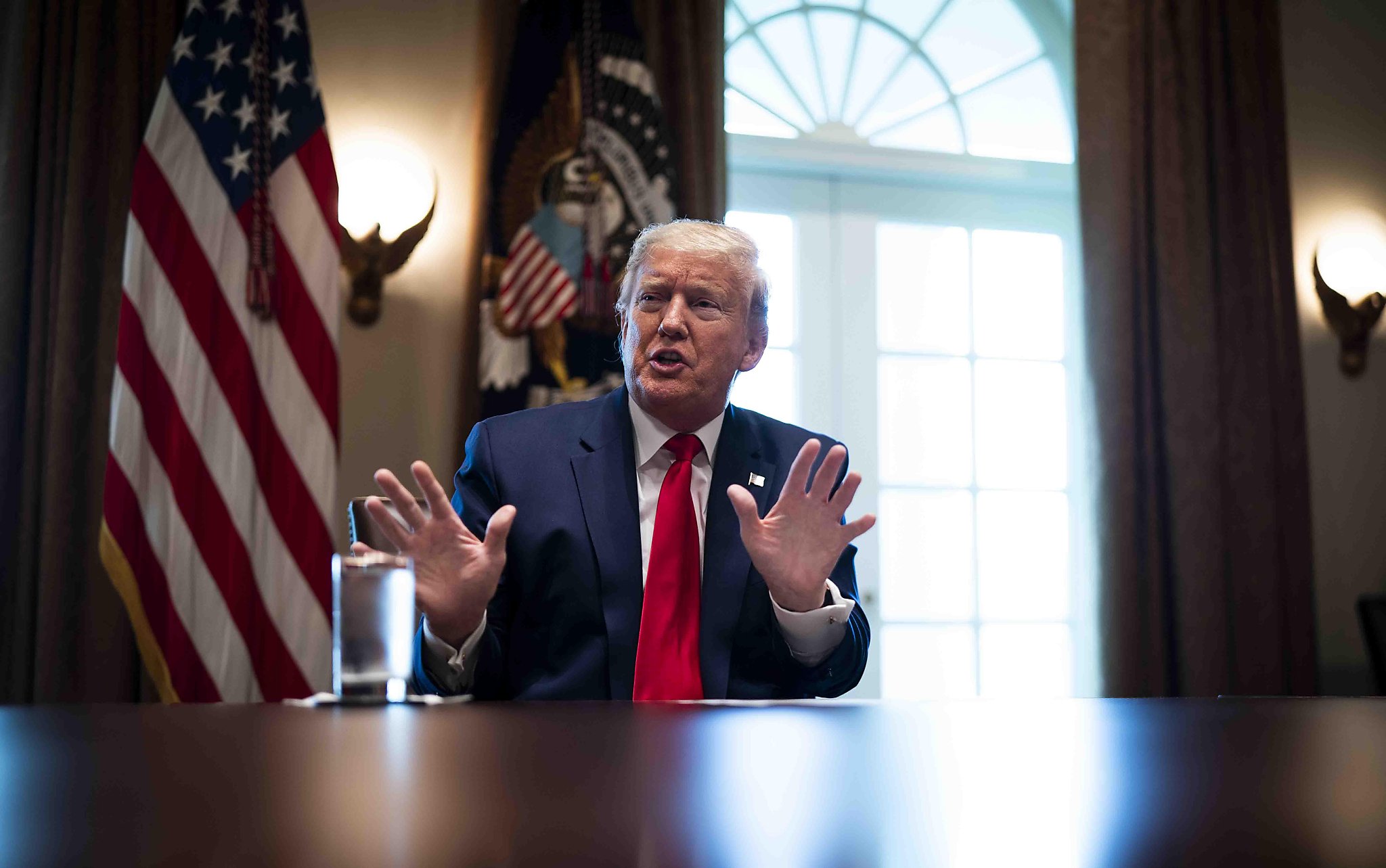Analyzing Trump's Stance On Cheap Oil And Its Effect On The Domestic Energy Industry

Table of Contents
Trump's Energy Policy: A Focus on Domestic Production and Deregulation
The Trump administration's energy policy prioritized domestic energy production and deregulation, significantly impacting the oil and gas industry. This approach aimed to stimulate economic growth and reduce reliance on foreign energy sources.
Deregulation's Impact on Oil and Gas Extraction
A cornerstone of Trump's energy policy was the rollback of environmental regulations. This deregulation significantly impacted oil and gas extraction, affecting drilling, fracking, and overall production costs.
-
Reduced Environmental Regulations: The administration eased restrictions on methane emissions, water pollution, and habitat protection, streamlining the permitting process for drilling and fracking operations. This led to:
- Increased drilling activity across the country, particularly in shale formations.
- Lowered exploration and extraction costs for energy companies.
- A surge in domestic oil and gas production.
-
Examples of Deregulation: Specific examples include the weakening of the Clean Water Act, the easing of restrictions on offshore drilling, and the scaling back of environmental impact assessments. These actions contributed to:
- A significant increase in crude oil production, making the US a leading global producer.
- Job creation in the oil and gas sector and related industries.
- Increased tax revenues for state and federal governments.
-
Environmental Concerns: While deregulation boosted production, it also raised environmental concerns. Increased fracking activity, for example, has been linked to water contamination and induced seismicity in some areas. The long-term consequences of reduced environmental oversight remain a subject of ongoing debate and research.
Emphasis on Fossil Fuels Over Renewables
Trump's administration showed a clear preference for fossil fuels, significantly impacting investment in renewable energy sources. This focus shifted government funding and policy support away from solar, wind, and other renewable energy technologies.
- Reduced Funding for Renewables: Funding for renewable energy research and development programs was significantly cut, diverting resources towards fossil fuel exploration and extraction.
- Policy Support for Fossil Fuels: Tax breaks and subsidies favored fossil fuel industries, making them more competitive compared to renewable energy alternatives.
- Long-Term Sustainability Concerns: This emphasis on fossil fuels raised concerns about the long-term sustainability of the US energy sector and its commitment to addressing climate change. The decline in investment in renewable energy technologies during this period could have long-lasting implications for the nation's ability to transition to a cleaner energy future.
- Consequences for Climate Change Goals: The prioritization of fossil fuels hampered progress towards the nation's climate change goals, raising concerns about increased greenhouse gas emissions and their environmental impact.
The Impact of Cheap Oil on the Domestic Energy Industry
While cheap oil initially seemed beneficial, it created complexities for the domestic energy industry. Price volatility and its effects on smaller producers were significant consequences.
Price Volatility and its Effects
The price of oil is inherently volatile, and periods of low prices, even if driven by increased domestic production, can have negative impacts on the industry.
- Challenges for Smaller Producers: Smaller, independent oil producers, particularly shale oil companies with higher operating costs, struggled to remain profitable during periods of low oil prices. This resulted in:
- Bankruptcies and mergers within the industry.
- Layoffs and job losses in oilfield service companies and related businesses.
- OPEC Price War: The Trump administration's policies, while aiming for cheap oil, also contributed to a price war with OPEC (Organization of the Petroleum Exporting Countries), further exacerbating price volatility and impacting profitability for many US producers.
Implications for Energy Independence
Trump's policies aimed to enhance US energy independence. However, the impact was complex and not uniformly positive.
- Increased Domestic Production: While domestic production increased significantly, the US still relied on oil imports, especially from allies and strategic partners.
- Balance of Trade: While the US reduced its net oil imports, the overall balance of trade in oil and gas remained a complex issue, impacted by global market dynamics.
- Geopolitical Implications: Increased domestic production lessened reliance on foreign sources, but did not entirely eliminate the geopolitical implications of global oil markets. The US still needed to navigate relationships with major oil-producing nations.
Long-Term Consequences and Future Outlook
The long-term consequences of Trump's energy policies are still unfolding, but several key impacts are evident.
The Legacy of Trump's Energy Policies
The legacy of Trump's energy policies includes both positive and negative aspects.
- Increased Domestic Energy Production: The increase in domestic oil and gas production created jobs and generated revenue but had environmental implications.
- Environmental Concerns: Relaxed environmental regulations resulted in heightened environmental concerns, including water pollution and greenhouse gas emissions.
- Price Volatility: The focus on cheap oil contributed to price volatility, negatively impacting smaller producers and creating economic uncertainty.
- Energy Security: The impact on long-term energy security and independence remains a subject of debate.
Conclusion:
This analysis has demonstrated that Trump's stance on cheap oil, achieved through deregulation and a focus on domestic fossil fuel production, had a multifaceted impact on the US energy industry. While it initially boosted production and created jobs, it also led to price volatility, challenges for smaller producers, and concerns about environmental sustainability and long-term energy independence. Understanding the complexities of Trump's cheap oil policy and its long-term effects is crucial for navigating the future of the US energy landscape. Further research and informed policy decisions are vital for ensuring a stable, sustainable, and secure energy future for the nation. Continue learning about the nuances of cheap oil policies and their effects on the domestic energy industry to contribute to a well-informed national energy dialogue.

Featured Posts
-
 John Wick In Las Vegas Embody The Baba Yaga
May 12, 2025
John Wick In Las Vegas Embody The Baba Yaga
May 12, 2025 -
 Ice Arrest Public Intervention Causes Chaos Cnn News
May 12, 2025
Ice Arrest Public Intervention Causes Chaos Cnn News
May 12, 2025 -
 Confirmation Of Jurickson Profars 80 Game Ped Suspension
May 12, 2025
Confirmation Of Jurickson Profars 80 Game Ped Suspension
May 12, 2025 -
 Kompany Onder Vuur Zware Kritiek Na Vernederende Nederlaag
May 12, 2025
Kompany Onder Vuur Zware Kritiek Na Vernederende Nederlaag
May 12, 2025 -
 Beyond Representation Authentic Storytelling For Asian And Asian American Media
May 12, 2025
Beyond Representation Authentic Storytelling For Asian And Asian American Media
May 12, 2025
Latest Posts
-
 Who Will Win The Championship Play Offs Newcastle Fans Weigh In
May 13, 2025
Who Will Win The Championship Play Offs Newcastle Fans Weigh In
May 13, 2025 -
 Championship Play Offs A Newcastle United Fan Perspective
May 13, 2025
Championship Play Offs A Newcastle United Fan Perspective
May 13, 2025 -
 Newcastle United Supporters Championship Play Off Predictions
May 13, 2025
Newcastle United Supporters Championship Play Off Predictions
May 13, 2025 -
 Sky Sports Premier League Retro Hd How To Watch Classic Games
May 13, 2025
Sky Sports Premier League Retro Hd How To Watch Classic Games
May 13, 2025 -
 School Stabbing Victim 15 Laid To Rest Funeral Information
May 13, 2025
School Stabbing Victim 15 Laid To Rest Funeral Information
May 13, 2025
